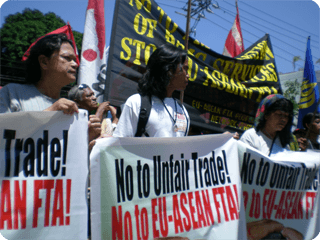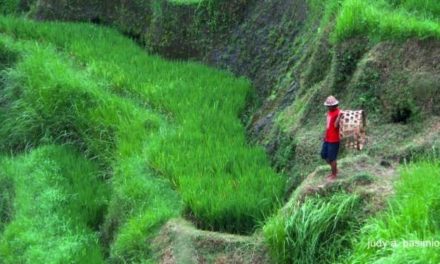We view with concern as well that in processes that are being opened to civil society, for instance, the Trade Sustainability Impact Assessment (SIA), organizations’ contribution in the consultation is being limited by the frame of only looking for mitigating and “flanking” measures, and not addressing the fundamental issues that govern any free trade agreement.
We believe that the voice of the sectors in any trade negotiations and agreements is particularly important in the light of the experience with existing EU FTAs where significant negative outcomes have occurred while many of the promised benefits have failed to materialise. For example, assessments of the EU-Mexico Global Agreement show a doubling of Mexico’s trade deficit with the EU since the FTA came into force. And contrary to the predicted benefits to employment and labour conditions since the signing of the EU-Mexico Agreement unemployment has risen and workers are increasingly facing precarious labour conditions and temporary employment contracts, below-standard wages and no social security. While foreign investments have increased, this has resulted mainly in foreign takeovers of domestic industries, without
generating additional employment or increases in remuneration.
The EU-ASEAN FTA negotiations are happening at a time when the ASEAN region is facing food, fuel, environment and employment crises. These crises have exposed the weaknesses of the policy of trade liberalization pursued by countries across the region and the cornerstone of the process of ASEAN economic integration. There have been calls for governments to revisit trade and development policies in the wake of the crisis. Unfortunately, instead of a strong critique of the existing free trade policies, the calls for reform tend to move towards more of the same market-oriented reforms.
As a result of this continued push for the same market-driven economy and aggressive liberalization, farmers continue to be threatened with land conversion, shifting from planting food to cash crops and production of biofuels or converting irrigated lands to accommodate real estate development; fishers’ fishing area are encroached upon by big commercial corporations and continued importation of cheap fish products continue to threaten their livelihood; indigenous peoples
continue to be displaced from their lands in the name of extractive industries like mining; workers’ tenure continue to be threatened, if not, altogether gone, and those that continue to work have to deal with cheap wages in unsafe working conditions; and the burden of women, who bear the brunt of job insecurity, low-productivity and limited resource-allocation for basic social services is exacerbated by further deregulation, liberalization and privatization as these FTAs push for opening up markets in government procurement and public utilities.
In this light, the undersigned civil society organisations are highly concerned that:
- The EU appears to be promoting anti-development policies with its push to incorporate the controversial Singapore issues already rejected at the WTO by various ASEAN members;
- The vast socio-economic disparities in ASEAN are not being taken into account as the EU is demanding full reciprocity and maximum frontloading of commitments without meaningful special and differential treatment beyond mere transition periods – which even the WTO allows;
- The liberalisation of services at a WTO-plus level, given the dominance of EU services companies, will tend to outcompete ASEAN services providers;
- The accompanying limitations on the ability of national governments to regulate in the public interest will jeopardise access to essential services, and have far-reaching implications for the poor and rural populations in both regions. Experiences with previous FTAs and our reading of EU policy heightens our concern that services negotiations will include essential services and public utilities like water, health, education, public transport, culture, etc.;
- Any EU-ASEAN FTA will leave the ASEAN countries worse off than the current GSP treatment, while demanding from these asymmetrical partners extensive WTO-plus liberalisation without allowing adequate special safeguard measures;
- Any EU-ASEAN FTA in these directions that pushes ASEAN to focus more on primary products as its major export in exchange for developing its capacity in manufacturing and processed products will render ASEAN economies to backtrack on its industrialization drive;
- EU requirements that ASEAN substantially lower its tariffs will result in a significant loss of revenue to developing countries which can not easily raise similar funds from other taxation sources;
- The EU’s high priority on access to raw materials as expressed in its key document setting out the future direction of its trade policy – ‘Global Europe: Competing in the World’ – will seriously undermine ASEAN countries’ capacity to maintain sovereignty over their natural resources, including restrictions on exports, investment and intellectual property rights;
- The EU will push for market access commitments with regard to government procurement, which will encroach on vital policy space needed for equitable wealth redistribution and social coherence necessary for nation-building;
- Intellectual property protection is already reducing access to affordable medicine and education in developing countries; and that the EU will require ASEAN countries to join additional intellectual property treaties, which will further increase the level of intellectual property protection – to the detriment of the right to health, education and other basic human rights.
Given the above, the undersigned civil society groups from ASEAN coming together in the Southeast Asian Peoples Caucus on EU-ASEAN FTA held in Quezon City, Philippines on 23 – 24 June 2008, call on the leaders ofASEAN:
1. To place people’s needs and rights at the heart of any economic development including trade arrangements through instituting and practicing political accountability on all economic decision-making processes, including bringing in civil society to participate as a full stakeholder, in order to arrive at equitable and sustainable development and trade systems;
2. To provide access to information and process both at the regional and national levels by making all documents relevant to the EU-ASEAN FTA negotiations available to the public (including but not limited to the following: a) Terms of Reference and negotiating framework/ mandate; b) drafts of the proposed agreement; c) studies and memoranda with regard to specific areas of negotiation or sectors under consideration, etc.);
3. To create mandatory spaces for public scrutiny of agreements, and inputs to the negotiation process through a) reporting by and people interface with Joint Committee Meetings and negotiation rounds; b)
broad consultation at the national, sectoral, and regional levels on the substance of the negotiation;
4. To ensure that voices of the sectors both at the national and regional levels are reflected in the official reports and presented by the negotiators to the relevant discussion forums and negotiations;
We believe that only through a people-centered economy and practice of democracy can the ASEAN peoples and economies reach its full potential and reap the benefits of an equitable and empowering development.
The undersigned,
EU-ASEAN FTA Campaign Network
Indonesia (Institute for Global Justice, KASBI (Carrefour Trade Union )
Malaysia (Monitoring Sustainability of Globalization (MSN), National Union of Bank Employees-Malaysia, National Union of Drink Industry Workers)
Thailand ( FTA Watch-Thailand, Alternative Agriculture Network, Assembly of the Poor, Consumer Federation of Thailand, People Living with HIV Network)
Vietnam (Vietnam Peace and Development Foundation, Vietnam General Confederation of Labour, National Committee for the Advancement of Women in Vietnam, Vietnam Association of Seafood Exporters and Producers)
Philippines (EU-ASEAN Campaign Network – Alab Katipunan, Alliance of Progressive Labor, Aniban ng Manggagawa sa Agrikultura, Action and Solidarity for the Empowerment of Teachers, Alyansa Tigil Mina, Association of Major Religious Superiors of the Philippines, Bukluran ng Manggagawang Pilipino, Coalition Against Trafficking of Women, Centro Saka, Inc., Freedom from Debt Coalition, Focus on the Global South, International Gender Trade Network-Asia, Institute for Popular Democracy, Justice, Peace and Integrity of Creation Commission, Jubilee South-Asia Pacific Movement on Debt and Development, Kalayaan, Kalipunan ng Maliliit na Magninyog ng Pilipinas, Kilusang Kababaihang Mangingisda, Kilusang Mangingisda, Kilusan para sa Pambansang Demokrasya, Kongreso ng Pagkakaisa ng Maralitang Tagalunsod, Koalisyon Pabahay ng Pilipinas, Legal Rights and Natural Resources Center-Kasama sa Kalikasan-Friends of the Earth, Manggagawa para sa Kalayaan ng Bayan, Makabayang Alyansa ng Magbubukid ng Pilipinas, Manggagawaing
Kababaihang Mithi ay Paglaya, Migrant Forum in Asia, Pambansang Koalisyon ng Kababaihan sa Kanayunan, Partido ng Manggagawa, SANLAKAS, Task Force Food Sovereignty, Triple 11-Pilipinas, Welga ng Kababaihan, WomanHealth Philippines, World March of Women, Zone One Tondo Organization, Confederation of Independent Unions, Integrated Rural Development Foundation, League of Urban Poor for Action, Teachers Dignity Coalition, Philippine Nurses’ Association)






![[IN PHOTOS] In Defense of Human Rights and Dignity Movement (iDEFEND) Mobilization on the fourth State of the Nation Address (SONA) of Ferdinand Marcos, Jr.](https://focusweb.org/wp-content/uploads/2025/07/1-150x150.jpg)

